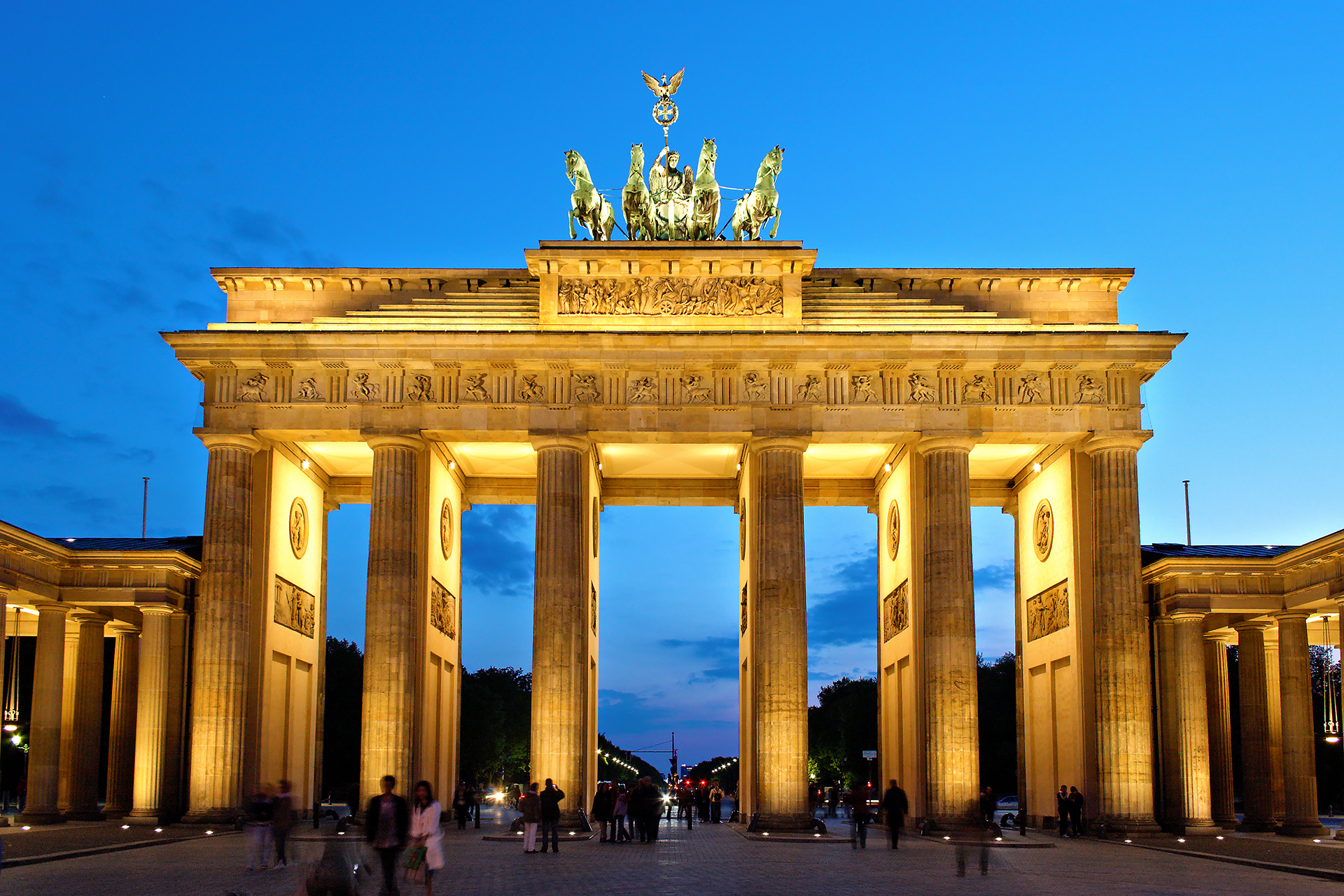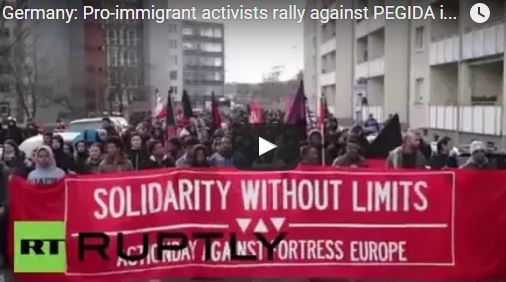..
German state of Saxony officially designates anti-Islam & anti-immigrant Pegida movement ‘extremist’
7 May, 2021 17:06
Germany’s security service in the eastern state of Saxony has officially classified the anti-Islam and anti-immigrant Pegida group as a “proven extremist organization.” The movement came to the fore amid the 2015 refugee crisis.
The Pegida movement (Patriotic Europeans Against the Islamization of the Occident) is now officially considered an extremist organization in its own “birthplace” – Germany’s eastern federal state of Saxony. The organization first came to be in the region back in October 2014, when Europe saw a massive influx of refugees and migrants from the Middle East and North Africa.
The group positioned itself as a grassroots movement opposing what they called a creeping Islamization of Europe, and gained prominence due to massive rallies it organized to show its discontent with the “open-door” policy of German Chancellor Angela Merkel.
Over the years, the group moved away from its “heterogenous” roots and “moderate demands” and instead adopted “increasingly radical and ultimately extremist” views, the regional branch of the Federal Office for the Protection of the Constitution (BfV) – a security service tasked with combating extremism – said in a statement, explaining its decision.
“Proven far-right extremists have had a significant influence” over the movement in recent years, the security service said, adding that they acted as “organizers, speakers and managers” of Pegida events. The group also started espousing views that directly contradict German basic law, the BfV noted, adding that the movement “rejected” the rule of law and the role of the parliament.
By giving a platform to various far-right extremists, Pegida also acted as a “lynchpin” between the far-right groups and ordinary people, the head of the BfV’s regional branch in Saxony, Dirk-Martin Christian, said in a statement.
“The resulting, ever deeper penetration of far-right extremist ideas into the core of [our] society is a serious threat to our free and democratic social order in the long run,” he added.
However, “peaceful participants” of the gatherings organized by Pegida, who simply used their “basic right on the freedom of expression,” have nothing to fear, since the security service will not put them under surveillance, he assured.
Pegida has repeatedly been accused of flirting with the far-right scene in Germany. The movement’s members were also no strangers to controversy. Its founder, Lutz Bachmann, was forced to step down from his role as Pegida leader in January 2015 after a photo of him dressed as Adolf Hitler emerged online.
Over the years that passed since the refugee crisis, the movement became much less noticeable. However, it also apparently moved beyond Germany, as Pegida supporters occasionally attempted to organize rallies in various countries, including Norway, Denmark, Spain, Switzerland, and Belgium.
It seems like strange timing on this. The group is deteriorating and has been for some time. The movement is virtually finished, and yet, Seehofer wants to make them criminal number one. The far-left is a far more dangerous segment of society (2nd story on link), and yet you never hear the government complain about them. Has Seehofer taken responsibility for Norway, Denmark, Spain, Switzerland, and Belgium?
Saxony, GDR
Car torched in East Jerusalem as clashes over
Palestinian evictions continue
7 May, 2021 12:14
A vehicle reportedly owned by a Jewish family was burnt out in East Jerusalem, where Israelis and Palestinians have been clashing over the looming eviction of several Palestinian families.
According to the Times of Israel, the groups threw rocks and chairs at each other. Palestinians reportedly set a car belonging to a Jewish family on fire, prompting a Jewish man to fire a weapon into the air. At least 15 Palestinians were arrested.
The Jerusalem Post said that fireworks were launched and rocks thrown at an office belonging to the leader of the Jewish right-wing Otzma Yehudit party.
East Jerusalem, home to both Jewish and Muslim holy sites, was captured by Israel from Jordan during the Six-Days War of 1967.
This week’s clashes erupted as a Jerusalem court is due to rule on a bitter dispute that involves four Palestinian families, which face eviction from their homes in favor of right-wing Jewish nationalists who argue that the land in the area was owned by Jewish groups before the establishment of the State of Israel. Israeli law allows Jews to reclaim Jewish-owned property in East Jerusalem from before 1948.
Disputes over land ownership lie at the heart of Israeli-Palestinian tensions, often leading to protests and violence in East Jerusalem and the West Bank. UN Middle East envoy Tor Wennesland called the situation in Sheikh Jarrah “worrying,” and urged Israel to end evictions of Palestinians and the demolition of their homes.
Israeli media reported that left-wing groups and Arab activists from other regions are expected to protest against Jewish settlements in East Jerusalem later on Friday. Muslims will also attend the final Friday prayers of the month of Ramadan in Jerusalem’s Old City amid a heavy police presence.
Sheikh Jarrah
Bomb blast puts former Maldives president in hospital,
as he undergoes surgery to treat shrapnel wounds
7 May, 2021 11:52
Maldivian police officers inspect the area after a blast outside the family home of the speaker of parliament, former President Mohamed Nasheed, in Male, Maldives May 6, 2021. © Maldives Police Service / Handout via REUTERS
Mohamed Nasheed, the former president of the Maldives and the current speaker of the country’s parliament, is undergoing surgery after suffering shrapnel wounds following a bomb blast outside his home on Thursday night.
The injuries were caused when a bomb attached to a motorbike detonated as he left his residence late on Thursday, with the explosion heard across the country’s capital, Male, leaving the 53-year-old with shrapnel wounds.
After he arrived at the medical facility, a spokesperson for Nasheed’s Maldivian Democratic Party confirmed he had been injured but was “stable” amid “ongoing” surgeries.
Footage on social media showed the aftermath of the explosion, with the remains of the damaged motorbike visible and police on the scene to aid those injured.
Bystanders were seen on video providing support to individuals who were caught in the bomb blast, with one person seen on the ground with what appears to be a bandage wrapped around their leg.
So far, no one has claimed responsibility for the explosion and security officials have not publicly identified a potential culprit.
A UK national is believed to have been injured in the explosion, according to local media reports, and Australian authorities have dispatched a team to the country to support the investigation.
After the explosion, the current Maldives president, Ibrahim Mohamed Solih, was seen arriving at the ADK hospital where Nasheed was being treated, having held a cabinet meeting earlier in the day and ahead of a nationally televised address on the situation.
Speaking in the wake of the bomb blast, Solih, who is seen as a close political ally of Nasheed, called the explosion an attack on “democracy and economy”, with security being stepped up around the country’s islands.
Turkish security forces arrest 8 ISIS terror suspects in simultaneous raids
at 15 addresses
7 May, 2021 08:46
Turkish security forces have carried out raids across the country’s largest city, arresting eight individuals in relation to suspected links to Islamic State, according to a state-run news agency.
Anadolu Agency, a state-run news agency headquartered in Ankara, said on Friday that at least eight individuals had been detained by police as anti-terror units simultaneously raided 15 addresses in 10 districts of Istanbul.
Security forces told the news agency that the individuals were detained for suspected links to IS and its operations in conflict zones. The suspects remain in police custody and under investigation.
Turkey declared ISIS a terrorist organization in 2013 and has engaged in a number of operations to defeat the group, which once occupied territory close to its south-eastern border.
They also engaged in a number of operations with the group.
The country has been attacked numerous times by people affiliated with IS. More than 300 people have died and hundreds more injured in at least 10 suicide bombings, seven incendiary attacks, and four assaults.
On Sunday, Istanbul police said they had captured the alleged military head of IS and a close aide to the group's former leader, Abu Bakr al-Baghdadi. A police statement said he had been arrested in the Atasehir district on the city’s Asian side last Wednesday.
The man, identified only by the codename ‘Basim’, had been travelling on false passports.
Does it seem odd to you that after 15 raids only 10 people were arrested?

































